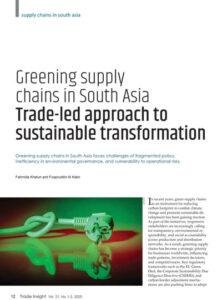 Greening supply chains has become a strategic priority for businesses worldwide, influencing trade patterns, investment decisions, and competitiveness. Key regulatory frameworks such as the EU Green Deal, the Corporate Sustainability Due Diligence Directive (CSDDD), and carbon border adjustment mechanisms are also pushing firms to adopt low-carbon practices, reduce emissions, and ensure ethical sourcing.
Greening supply chains has become a strategic priority for businesses worldwide, influencing trade patterns, investment decisions, and competitiveness. Key regulatory frameworks such as the EU Green Deal, the Corporate Sustainability Due Diligence Directive (CSDDD), and carbon border adjustment mechanisms are also pushing firms to adopt low-carbon practices, reduce emissions, and ensure ethical sourcing.
Greening the supply chain is crucial for South Asia due to the region’s high involvement in international trade exposure, rapid industrialisation, and severe environmental degradation. For instance, countries like Bangladesh, India, Pakistan, and Sri Lanka in South Asia have become an integral part of global supply chains, especially for textiles, apparel, and agro-processing industries. At the same time, the region faces critical challenges related to air and water pollution, resource depletion, and rising greenhouse gas emissions stemming from industrial activities. While global markets are increasingly imposing strict environmental compliance and due diligence requirements, failure to ensuring the green supply chains in the region could risk market access, foreign investment, and longterm economic growth.
As global call for sustainable and transparent supply chains intensifies, South Asian countries face challenges that can lead to an opportunity to transform the traditional industrial and trade practices into a sustainable one. Against this backdrop, this article discusses strategy that can support this transition, including regulatory reform, capacity building, and regional cooperation to foster more sustainable, competitive, and resilient supply chains.
Authors: Fahmida Khatun and Foqoruddin Al Kabir
Publication Period: August 2025


